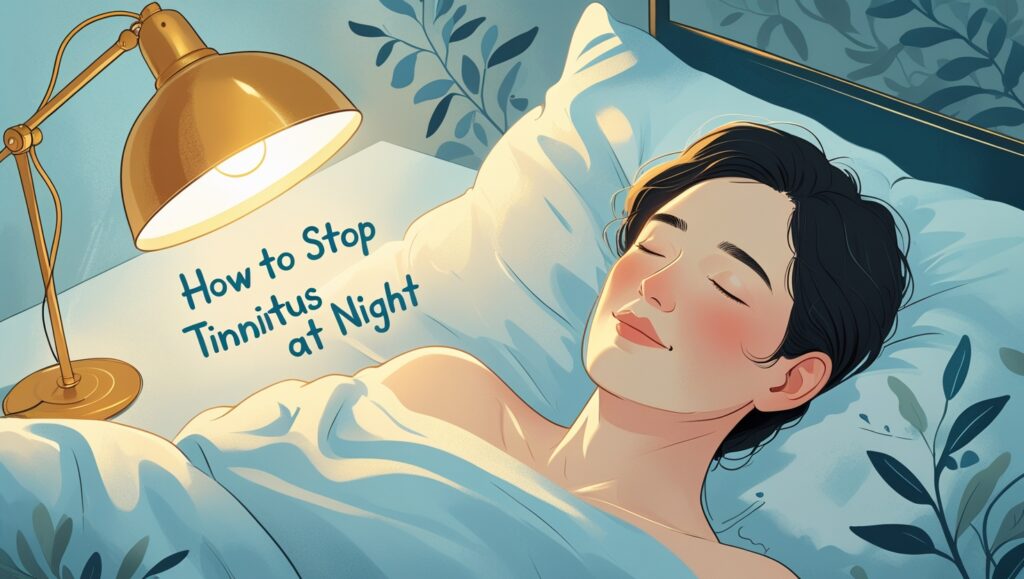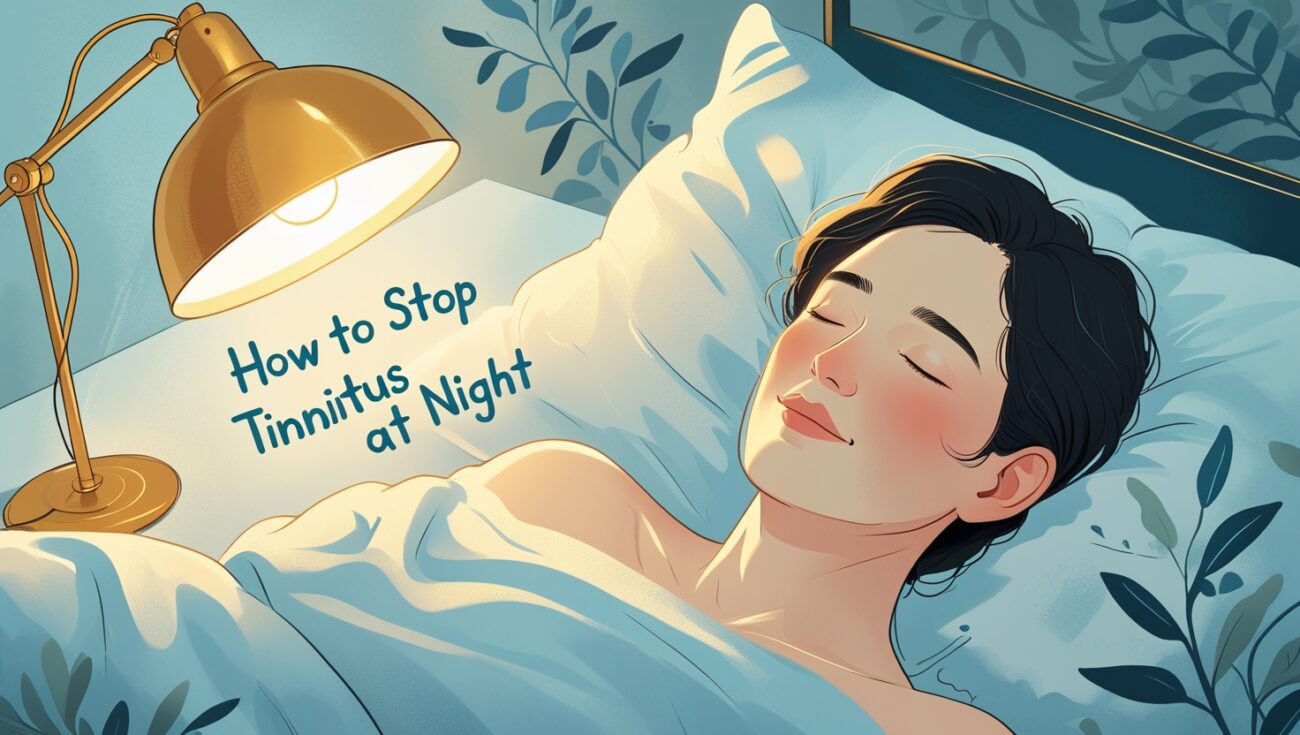How to Stop Tinnitus at Night (Simple Tips That Help)
If you’re like me, you know how frustrating it can be to deal with tinnitus at night. That constant ringing, buzzing, or hissing in the ears can make it almost impossible to relax and fall asleep.
I struggled with this for months. I used to toss and turn, counting sheep, trying every trick in the book — but nothing worked… until I discovered a few simple tinnitus remedies that made a huge difference in my sleep quality.
In this post, I’ll share exactly what I did to stop tinnitus at night — naturally — and how you can do it too. Plus, I’ll show you a powerful solution I personally use that has helped me more than anything else (you can check it out right here).

Table of Contents
Why Is Tinnitus Worse at Night?
First, if you’ve noticed your tinnitus symptoms get worse at night, you’re not alone. This is super common — here’s why:
- Silence at night makes tinnitus louder. During the day, background noise masks the ringing. But when it’s quiet in your bedroom, that buzzing takes center stage.
- Stress and fatigue can trigger tinnitus flare-ups, and by bedtime, you’re often more stressed or mentally drained — making symptoms worse.
I realized that once I addressed both the stress and the silence, my nights became a lot more peaceful.
Simple Tips That Help Stop Tinnitus at Night
1. Use Gentle Background Noise
This was a game-changer for me. Playing white noise, soft nature sounds, or calming music can help “mask” the ringing and make it less noticeable.
I now keep a simple white noise app running on my phone — it really helps me drift off without focusing on the noise in my ears.
2. Practice Relaxation Before Bed
Stress and anxiety make tinnitus worse, period. I found that adding 10 minutes of deep breathing, stretching, or guided meditation before bed helps calm my nervous system — which makes the tinnitus fade into the background.
3. Avoid Stimulants Late in the Day
One thing I didn’t realize at first was how much caffeine and sugar impact tinnitus.
I cut out coffee and soda after 2 PM and noticed the ringing was less sharp at night. If you love your coffee, try switching to herbal tea in the afternoon — it really helps.
4. Support Your Ears and Nervous System Naturally
After trying dozens of supplements, ear drops, and “miracle cures,” I finally found something that actually works for me — a natural formula designed specifically to help with tinnitus relief and ear health.
It’s called Quietum Plus, and I honestly wish I had found it sooner. Since I started taking it, my tinnitus has been so much calmer — and my sleep is better than it’s been in years.
If you want to try it for yourself, you can check it out here:
Click here for the Quietum Plus official site
Final Thoughts
Living with tinnitus doesn’t have to mean sleepless nights.
Once I made a few simple changes — adding background noise, calming my body, avoiding late stimulants, and supporting my ear health with Quietum Plus — I finally got the relief I had been looking for.
If you’re struggling with tinnitus at night, I encourage you to give these tips a try. And if you want extra support, take a look at Quietum Plus here — it made a big difference for me, and it might help you too.
Here’s to quiet nights and better sleep!
One thing I also noticed is that the more aware I became of my body and sleep routine, the easier it was to manage tinnitus at night. I started tracking what I ate, how much screen time I had, and how much tension I was holding in my neck and shoulders — and it all connected back to the ringing.
Neck and jaw tension are big culprits that many people don’t realize contribute to ear ringing. I began adding simple neck stretches and jaw relaxation exercises before bedtime. The relief was noticeable — reducing muscle tightness helped calm my tinnitus naturally.
Another overlooked factor is hydration. Believe it or not, dehydration can actually make ear ringing worse. I now make sure to drink plenty of water throughout the day (and especially in the evening), but I stop about 1 hour before bed so I’m not waking up all night.
Blue light exposure from phones and computers late at night made my tinnitus symptoms louder. Once I started wearing blue-light-blocking glasses in the evening, I noticed my sleep improved — and so did my ear ringing.
I also experimented with changing my pillow. A firm pillow that keeps my neck aligned reduced strain on my neck and jaw muscles, which, surprisingly, helped lower the intensity of tinnitus at night.
For some people (like me), certain high-sodium foods can trigger more ear ringing. Cutting back on salty snacks and processed foods made my nights quieter. I started focusing on whole foods and balanced meals — it truly helps.
Ear health supplements became part of my nightly routine. But let me be real — not all supplements worked. The only one that noticeably reduced my tinnitus was Quietum Plus — and it’s been a game-changer. You can check it out here: Quietum Plus official site.
I learned that sleeping on my side sometimes made the ringing worse, depending on the position. Now I sleep on my back with a supportive pillow — this reduces pressure on my ears and neck, making tinnitus at night easier to manage.
Having a consistent bedtime routine is another powerful way to reduce tinnitus flare-ups. I aim to go to bed at the same time every night — it really helps reset the nervous system and train the brain to relax, instead of hyper-focusing on the ringing.
One mistake I made early on was trying to “fight” the ringing, which only made it worse. Now, I accept that it’s there — but I use tools like white noise machines and calming supplements so my brain doesn’t fixate on it. This shift in mindset made a huge difference.
Don’t underestimate the power of daily light exercise. When I started taking 30-minute walks in the afternoon, my stress went down — and that stress reduction led to fewer tinnitus spikes in the evening.
Magnesium is one mineral I swear by for calming my nervous system. I take a magnesium supplement an hour before bed — it helps me relax and reduces the intensity of the ear ringing.
If you notice your tinnitus gets worse after a long day of loud noise exposure, it’s important to protect your ears. I now carry high-fidelity earplugs when I’m in noisy environments — they protect my hearing and keep my tinnitus from flaring up later at night.
I also want to mention that cognitive behavioral therapy (CBT) for tinnitus can be very effective. I didn’t personally do a full program, but I used some free CBT techniques online that helped me reframe how I react to the sound — which reduced the stress around it.
Keeping my bedroom cool and dark also helped a lot. Cool room temperatures promote deeper sleep and seem to lower the body’s overall stress response — helping me deal with tinnitus at bedtime more easily.
One big “aha” moment for me was realizing that certain medications I was taking could make my tinnitus worse. Always check with your doctor — but after adjusting my meds, my ringing at night improved significantly.
Adding mindfulness practices to my day also helps. Whether it’s five minutes of quiet breathing or simple gratitude journaling, the more calm I create in my life, the less noticeable my tinnitus during sleep becomes.
Finally — be patient. Healing from chronic tinnitus takes time. But with the right tools, natural supplements like Quietum Plus check it out here, and consistent habits, I’m living proof that you can get real relief — and enjoy peaceful, quiet nights again.


One thought on “How to Stop Tinnitus at Night (Simple Tips That Help)”